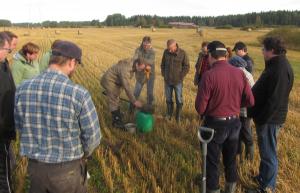Collaborative learning and tools for assessing soil health contribute to farmers’ understanding of problems and alternative management strategies.

The objective of the OSMO project was to improve on-farm resource efficiency and deliver the most up-to-date knowledge on soil health management to farmers. It also tested and developed new tools for soil health analysis, planning and management. Eight test fields were analysed briefly to identify problems with soil health. Simplified decision-support tools were developed to address the complexity of the soil systems as well as the farm management needs.
The blended learning approach used in the project’s study groups was well received. E-learning designed to meet farmers’ needs and skills was complemented by theoretical workshops and practical field days. Project participants gained new knowledge and skills and were able to improve their soil health management at farm level during the project’s lifespan. The project improved farmers’ soil management skills and know-how for profitable and resource-efficient farming. The farmers also acquired knowledge on how to enhance soil quality to reduce erosion, increase the soil’s organic matter and carbon sequestration and build its capacity to adapt to climate change. The main actions undertaken by the project are:
The project was developed around the concepts of holistic soil health management and farmer-oriented tools and training. Versatile methods were developed to engage farmers around assessing, planning and implementing soil management differently, combining scientific knowledge with the farmers’ practical on-farm needs. E-learning and significant collaboration between farmers in study groups resulted in new knowledge and skills and the trialling of practices that improve soil health and increase farmers’ ability to adapt to climate change.